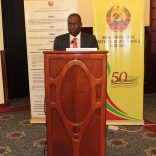Mozambique: Mining company will spend $1.5 million to compensate Balama residents - AIM report | ...
Update- IFC close to US$2.7 bln debt refinancing for Mozambique’s Nacala railway

File photo / IFC, a member of the World Bank Group, is the largest global development institution focused exclusively on the private sector in developing countries.
The International Finance Corporation, part of the World Bank, expects to close a $2.7 billion debt refinancing for the Nacala Corridor railway project in Mozambique early next year, a senior IFC official said on Friday.
The refinancing could help to ease balance sheet pressure on Brazilian miner Vale which is developing the railway and a coal mine in the region.
“The plan is to close by the end of the first quarter 2017,” Marcel Bruhwiler, the IFC’s principal investment officer for infrastructure and natural resources, told Reuters on the sidelines of a gas conference in Cape Town.
Vale last month agreed new terms for the sale of stakes in the mine and railway project to fellow shareholder Mitsui & Co , a deal which hinges on the approval of a project finance plan.
The newly built 912 km line, which links Vale’s Moatize coal mine in Tete in the north of Mozambique to the Nacala port on the east coast and crosses over into Malawi, will also be used to move general freight and passengers as the southern African nation recovers after decades of civil war.
Vital to enhancing access to global markets, the project has an initial capacity of transporting up to 22 million tonnes a year of which 18 million will be allotted to Vale’s Moatize mine, the IFC has said.
Bruhwiler said the IFC, the private lending arm of the World Bank, was looking to commit up to $200 million on its own account for the deal, in which it was the co-lead arranger together with the African Development Bank and the Japan Bank for International Cooperation.
However, budgetary scandals as well as security concerns, which have included frequent stoppages along the different Sena-to-Beira port coal line due to gunfire, could lead to delays, he said.
“Right now there are still many risks which could derail such a big undertaking, not the least it’s the macro-economic and security situations,” Bruhwiler said.
The International Monetary Fund (IMF) in August demanded an external forensic audit of Mozambique’s public debt to regain investor confidence after a scandal involving more than $2 billion in secret loans led to the international lender suspending budgetary assistance to one of the world’s poorest countries.
“Investors want to have clarity whether the IMF will re-engage at some point in time,” Bruhwiler said, adding that he was “cautiously optimistic” the $2.7 billion syndicated loan will be successful given the strength of the sponsors and huge coal reserves in Tete province.













Leave a Reply
Be the First to Comment!
You must be logged in to post a comment.
You must be logged in to post a comment.